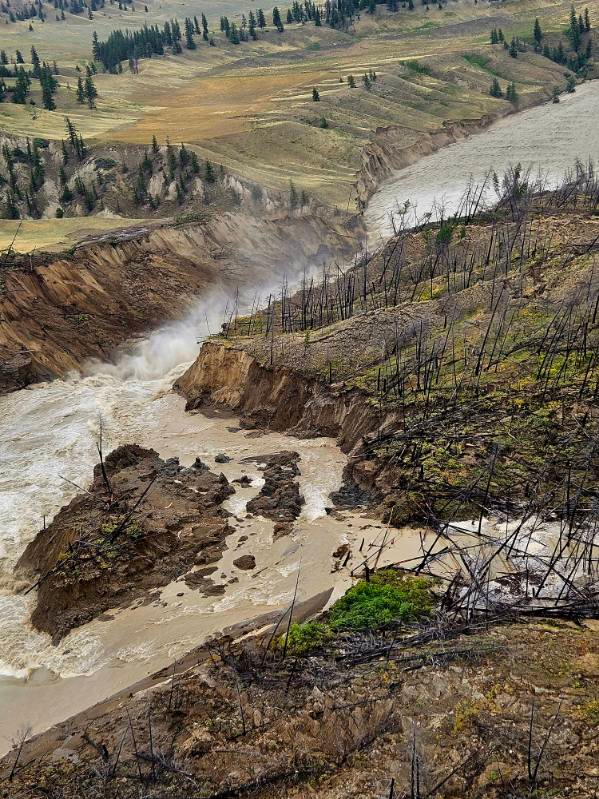York University Professor Emma Feltes has been working closely with the Tsilhqot'in National Government (TNG) to document the disaster's impact and advocate for strong Indigenous leadership in emergency response.

Emma Feltes
The landslide, which occurred at Nagwentled (Farwell Canyon), blocked the Tsilhqox (Chilcotin River) and posed significant threats to the region's salmon population. In response, TNG declared a state of local emergency, issued evacuation orders and halted all fishing activities to protect the ecosystem.
While provincial and federal governments launched their own emergency efforts - which were at times aligned but often discordant with the TNG - those responses highlighted gaps in disaster management and jurisdictional respect.
"They failed to communicate and coordinate with the Tl'esqox First Nation - the Tsilhqot'in community closest to the landslide which has deep, generational knowledge of the landscape and its management," says Feltes, as assistant professor in York's Faculty of Liberal Arts & Professional Studies. "The area known as Nagwentled - meaning "sliding area across the river," "land that moves," and "muddy waters" - is a sacred area vital to the Tsilhqot'in people, extensively used for cultural and traditional practices, including fish camps."
In the wake of the landslide, Tsilhqot'in leaders asked Feltes, alongside Crystal Verhaeghe from Emoda Consulting and Jocelyn Stacey from the University of British Columbia (UBC) to document the event. This team has worked in close collaboration with TNG to conduct independent reviews of emergencies in the area since 2017, following major wildfires that swept through Tŝilhqot'in nen (land).
"TNG sees this practice of documenting disasters as an expression of self-government," says Felte, adding that the team's project aims to guide future leaders on how to address crises. "At the same time, it will guide provincial and federal governments on how to respect Indigenous jurisdiction through disaster."
In the fall of 2024, the research team released a series of four reports known as the "Learnings," each addressing different aspects of the landslide's impact. The team also published accompanying TikToks, and followed that with a new set of calls-to-action released on Feb. 6.

Flow in the river starting again on the morning of Aug. 5, 2024.

Breach at the Farewell Bridge, Aug. 5, 2024
The Learnings include:
- Learning 1: Nagwentled (Muddy Waters) highlights the deep cultural and ecological significance of the area to the Tsilhqot'in, calling for a renewed commitment to land and water stewardship and stronger collaboration with government partners.
- Learning 2: Tsilhqox Biny Ts'eman emphasizes the critical role of the Tsilhqot'in in safeguarding salmon populations, particularly the unique Chilko Lake sockeye, and underscores the importance of Indigenous-led conservation efforts.
- Learning 3: The Emergency Salmon Task Force showcases a major success - the formation of a task force under Tŝilhqot'in leadership, working alongside government and technical experts to ensure salmon survival and recovery.
- Learning 4: Protocol & Jurisdiction in an Emergency examines inconsistencies in government responses, revealing the need for greater recognition and implementation of Tsilhqot'in jurisdiction in emergency management.
A final report that consolidates these findings and outlines calls to action for stronger Indigenous governance in emergency management will be formally launched at UBC on Feb. 24.
The Tsilhqot'in Nation has invited partners and policymakers to engage with the report and apply its lessons to future disaster management efforts. The event at UBC will include a press conference, providing an opportunity for broader discussions on Indigenous leadership in crisis response and environmental governance.
"As the impacts of the 2024 Tsilhqot'in landslide continue to unfold, the Tsilhqot'in Nation invites all its partners to learn from this landslide and the reflections and lessons shared in this report," reads the report. "Understood from a Tsilhqot'in perspective, Nagwentled and the 2024 Tsilhqox landslide can guide all our relationships in a changing world."
This story was originally featured in YFile, York University's community newsletter.









